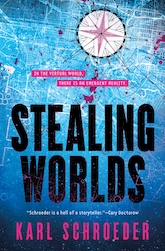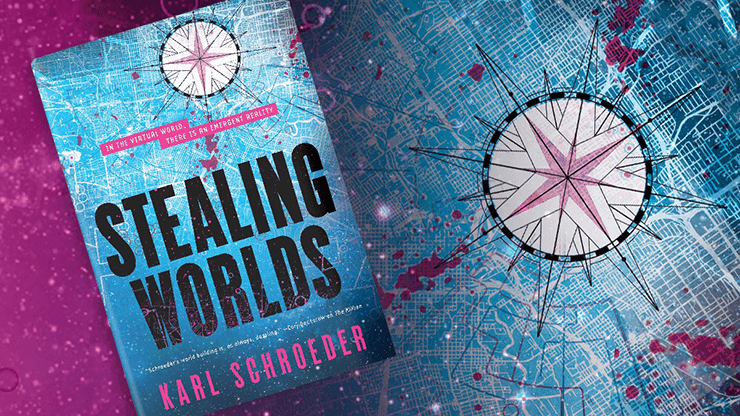Sura Neelin is on the run. In a near future where jobs are increasingly scarce, and making a living even more precarious if you aren’t a trillionaire, the news of the murder of her father, down in Peru, knocks her life completely off-kilter. Hunted by forces she doesn’t quite know or comprehend, she finds help and refuge, and starts to build a life and power for herself in an unanticipated way. For, you see, virtual reality overlay worlds—larpworlds—are slowly building in significance and power, and it is by joining and leading those communities that Sura has a chance not only to find out the truth about her father’s death, but perhaps help change society itself.
This is the setting and setup of Karl Schroeder’s Stealing Worlds.
Warning: Minor spoilers for the novel.
Schroeder’s novel borrows significantly from his previous work, combining various ideas he has explored in shorter fiction into a cohesive whole. This is a deep Science Fiction novel, and while ostensibly it looks like it might have mass appeal—and on a surface level it certainly has an accessibility to it—it really is deeply tied to both his previous work and a lot of the genre fiction that tries to explore the same short and short-medium future on which a lot of SF authors have struggled to find footing. Schroeder boldly marches into it, and Stealing Worlds resonates with his own work as well as others’.
When the reader encounters the concept of the AIs known as deodands late in the novel, it does come from the point of view of the protagonist, who knows little of them. And so Schroeder makes no assumptions about greater reader knowledge. There is an additional richness to the concept if you’ve read his previous work, but I was charmed all over again by the idea of artificial intelligences embodying and taking on the mantle of its landscapes, even negative aspects. While fantasy is not a genre I associate with Schroeder, the deodands (which is a term that is also used in Jack Vance’s Dying Earth) really do feel like mythological genius loci, approaching a technology that seems magical.
Buy the Book


Stealing Worlds
On the other hand, if you have read the METAtropolis story of the titular name, you are prepared to see how that concept applies in this setting. And that thought does make me wonder, in the context of other Gennady Malianov stories—is this the same world that Malianov inhabits, or a close shadow of it? While stories like “To Hie From Far Cilenia” and “Laika’s Ghost” really explore Malinaov’s relation with virtual realities, the spaces that Sura encounters feel like more developed and thought-out versions of those worlds. Particularly in a sequence where Sura is trying to juggle perceptions of the LARP reality she is in, and at the same time the real-world terrain, I kept thinking back to Malianov.
And then there are the other SF works in this space, the resonances of which I kept feeling and seeing throughout this novel. Bruce Sterling’s Maneki Neko really feels like it was an ur-text for this novel. That giving economy of exchange, or bizarre and (to outside observers) incomprehensible series of actions and reactions that form a type of economy, was a story that kept coming to mind. This was especially the case in the early portion of the novel, as Sura is trying to find her footing in the wake of her father’s death and learning about the larpworlds. Similarly, Madeline Ashby’s Company Town, the work of Cory Doctorow (most notably Walkaway), the early portions of Elizabeth Bear’s Jenny Casey novels, Vernor Vinge’s Rainbow’s End, Roger Zelazny’s Donnerjack, and, doubtless, many other novels and stories I haven’t yet read. Stealing Worlds is rich in this genre metatext and genre conversation.
Stripping away all those layers, however, all of those connections and intonations, the novel has to stand or fall on the merits of the book itself. One of the secret sauces of Schroeder’s writing, for me, is that his worldbuilding does not overwhelm the narrative. By showing us enough of the superstructure to help us imagine it in a greater playground of the imagination, he encourages the notion of further stories and characters in the world. It’s a future that probably won’t ever happen, but it’s a future that as I was reading felt that it could truly happen, and it has the combination of logical extension of trends with the occasional curious and unusual bit, just like real history itself. Schroeder explores political insecurity, government versus corporate power, climate change, cryptocurrencies, the future of work, and much more in his near-future setting.
The novel’s structure is fascinating, as well. Schroeder is patient in his narrative, holding back the initial mystery of the game—the reason why Sura’s father was killed hangs over the narrative as Sura builds a new life for herself and learns what the larpworlds are and what they can do. As the novel heads into the second half, though, the teasing hints and subtle references that there is a “Frame” beyond the larpworlds finally pays off, revealing the true forces that have been influencing the narrative from the start. So as Sura dives deeper and deeper, the veils that are hiding what is moving and shaping the world are further and further stripped away. The main setting, a steampunk realm in which Sura heavily invests herself, is wonderfully portrayed, especially in those instances when Sura must face challenges existing in the real world, and in the virtual, in different and sometimes nearly orthogonal ways.
The novel really rises and falls on two characters. Sura, of course as our point of view and our entry point, really resonates with the reader as she learns about the spheres within the spheres of larpworlds that overlay our own. Her journey of discovering the larpworlds, and what lies even further beyond, mirrors our own, and her run into the worlds beneath the world is entertaining and page-turning. Further, there is a real theme of growth as an extension of play, as Sura learns to believe in her abilities, and extend them, and to make connections with people through her larpworld identities. In particular, her steampunky Countess Vesta (which reminded me some of the work of Alex Acks) proves to be the most persistent public identity she has in the larpworlds, and the character and persona that her new friends and allies come to know, and rely upon when things go wrong, both in the games and IRL. Sura builds community and connections, and eventually learns to call upon those connections for help, as she is called upon in turn. Stealing Worlds can be thought of as a novel about building networks of relationships and communities to support each other in a chaotic, fraught age of climate change, political upheaval, and economic insecurity.
In that same vein, but reversed, is the character of Compass. We meet Compass early on, as she is the Morpheus to Sura’s Neo, showing her just how deep the rabbit hole really goes. She is the “compass” for Sura, and the reader in a literal sense. And yet, who she really is, the flesh-and-blood person behind the persona, is a mystery. She embodies the new economy, the new normal, of living as much within the larpworlds as is possible, having immersed herself into those characters therein. And so she is a herald of what Sura can, and in time does, become herself. In the end, Sura does exceed Compass, when she encounters and bargains with the deodands—and in doing so, comes full circle with the original inciting incident of the novel as well.
Stealing Worlds is the novel for you if you want to see someone disenfranchised by the new economy of the near-future to find security, autonomy, power and the chance for major social change by immersing herself into virtual characters like her steampunky Countess Vesta—building fantastic virtual worlds that ultimately are used to improve our own.
Stealing Worlds is available from Tor Books.
An ex-pat New Yorker living in Minnesota, Paul Weimer has been reading sci-fi and fantasy for over 30 years. An avid and enthusiastic amateur photographer, blogger and podcaster, Paul primarily contributes to the Skiffy and Fanty Show as blogger and podcaster, and the SFF Audio podcast. If you’ve spent any time reading about SFF online, you’ve probably read one of his blog comments or tweets (he’s @PrinceJvstin).










